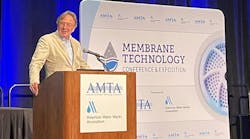By Patrick Crow
A legislative repair and a budget recalculation have improved the prospects for launching the Water Infrastructure Finance and Innovation Authority (WIFIA) federal loan program.
Congress approved the 5-year WIFIA pilot program a year ago under the Water Resources and Reform Development Act. It authorizes the Environmental Protection Agency (EPA) and the Corps of Engineers together to offer $350 million in low-interest loans for water and wastewater infrastructure projects costing at least $20 million (or $5 million for improvements serving 25,000 or fewer people). WIFIA would function independently of the Drinking Water and Clean Water state revolving funds.
Just before passage, in order to make the program budget-neutral, Congress limited federal funding to 49 percent of the cost of projects and banned the use of tax-exempt bonds for financing the rest.
Water groups have been pushing for a reversal of that. They include the American Water Works Association (AWWA), the Association of Metropolitan Water Agencies (AMWA), the National Association of Clean Water Agencies, the Water Environment Federation, and the Water & Wastewater Equipment Manufacturers Association, as well as the U.S. Conference of Mayors and the National Association of Counties.
The water groups told the Senate Committee on Environment and Public Works: "Our water utility members have warned that requiring WIFIA loan recipients to draw at least 51 percent of project funding from sources aside from municipal bonds and other tax exempt debt would significantly discourage use of the new loan program."
They said WIFIA recipients should be able to seek additional sources of funding, such as taxable debt or a partnership with a private sector organization, to ensure maximum flexibility.
The Senate environment panel agreed and recently attached a WIFIA correction to an unrelated transportation bill. AWWA Legislative Director Tommy Holmes said, "We remain hopeful that a fix to WIFIA's municipal bond financing restriction could be part of the next long-term transportation reauthorization bill that moves through Congress."
A reversal may also be sought in the House of Representatives. Dan Hartnett, AMWA's director of legislative affairs, said, "The Transportation and Infrastructure Committee has not unveiled its version of a long-term transportation bill, but we remain in contact with lawmakers about including it (the WIFIA fix)."
Paying for the WIFIA fix is another issue. The Senate Finance Committee is expected to consider options to offset the cost in deliberations later this year.
The good news is that the congressional Joint Committee on Taxation (JCT) recently reported that reversing the ban would reduce federal revenues by $17 million over the next 10 years. That's far less than JCT's original $135-million estimate and reduces the funding problem.
AMWA noted that JCT originally assumed communities would use WIFIA funds for 49 percent of projects and issue additional tax-exempt municipal bonds for the balance. JCT estimated that would deprive the federal government of $135 million in tax revenues over 10 years, although it never fully explained its calculations.
"Without a source of funding to offset this ($135-million) cost, lawmakers simply negated the problem by barring communities from using tax-exempt debt on WIFIA-funded projects -- although AMWA and others warned that this would undermine the value of WIFIA to many communities," the water group said.
Congressional appropriations committees preliminarily have allocated EPA $4.4 million to administer the new program in fiscal 2016. EPA staff has been developing guidelines. So far, the committees have not proposed actual funding for the initial year of the WIFIA program.
About the Author: Patrick Crow covered the U.S. Congress and federal agencies for 21 years as a reporter for industry magazines. He has reported on water issues for the past 15 years. Crow is now an Austin, Texas-based freelance writer.


